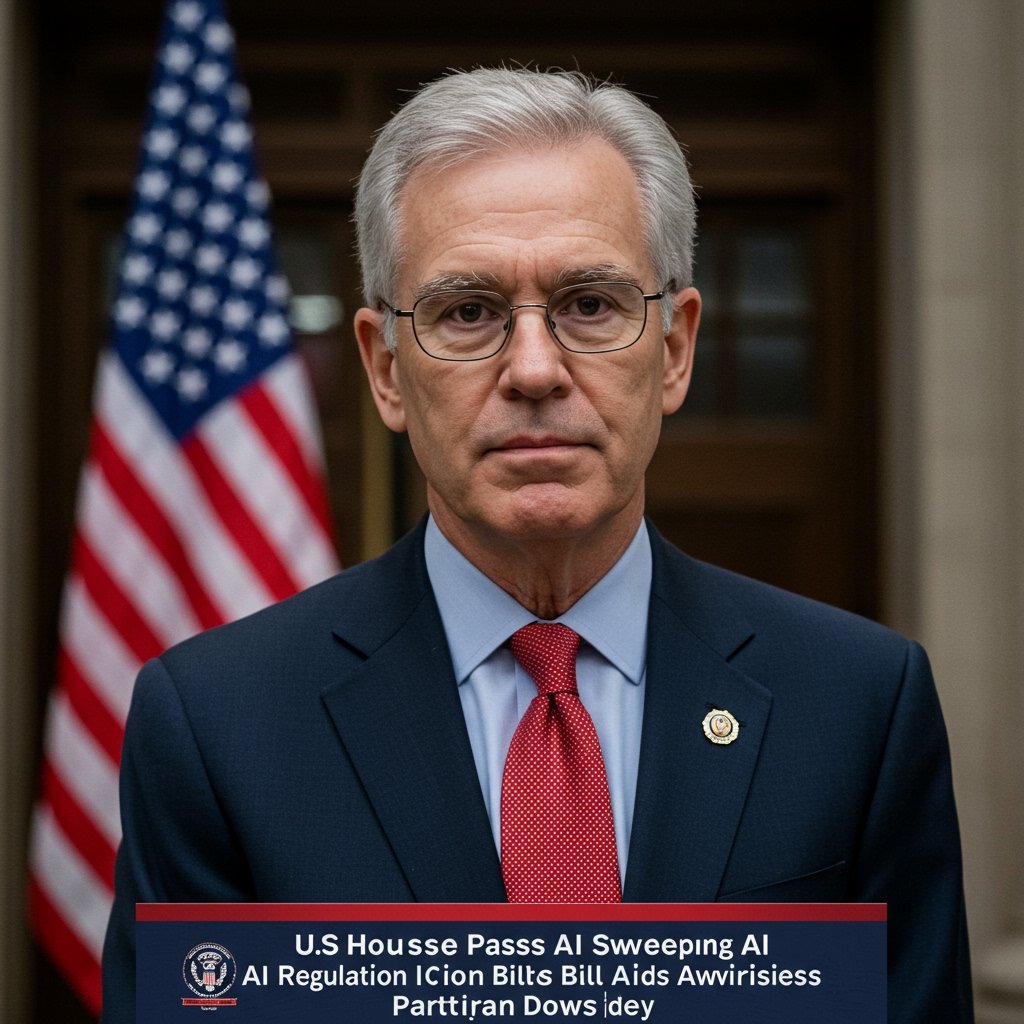Historic AI Regulation Bill Clears US House
The U.S. House of Representatives today marked a significant legislative milestone, passing H.R. 7890, officially known as the “Artificial Intelligence Accountability and Transparency Act.” The vote, held after hours of intense debate on the House floor, concluded with a tally of 235 yeas to 198 nays, largely along party lines. This landmark legislation represents the most substantial federal effort to date aimed at governing the burgeoning field of artificial intelligence.
Key Provisions of H.R. 7890
At the heart of the “Artificial Intelligence Accountability and Transparency Act” is the establishment of a completely new federal entity: the National AI Regulatory Commission (NARC). This commission is envisioned as the central authority for overseeing AI development and deployment across the nation. The bill explicitly tasks NARC with a multifaceted mission focused on mitigating the potential harms and risks associated with rapidly advancing AI technologies.
Specifically, the NARC will be responsible for setting comprehensive safety standards for AI systems. These standards are intended to ensure that AI applications, particularly those deployed in sensitive or critical sectors, operate reliably and without causing undue harm. Beyond safety, the bill mandates rigorous risk assessments for AI systems deemed “high-impact.” This requirement aims to identify and analyze potential biases, security vulnerabilities, and other risks before such systems are widely implemented in areas affecting civil rights, employment, credit, or public safety.
Furthermore, H.R. 7890 includes significant provisions aimed at increasing transparency within the AI ecosystem. It mandates that developers and deployers of AI systems adhere to new requirements regarding how their systems function, what data they are trained on, and how decisions are made. The goal is to provide the public, regulators, and affected individuals with clearer insight into the workings of complex AI, fostering greater accountability.
Proponents Argue Necessity for Risk Mitigation
Supporters of the bill, predominantly Democrats, championed the legislation as a necessary and urgent response to the societal risks posed by unchecked AI development. Representative Emily Carter (D-NY), the lead sponsor of H.R. 7890, was a vocal advocate during the debate. Speaking on the House floor, she emphasized the potential for AI to exacerbate existing inequalities, automate bias, and even pose existential threats if not properly governed.
“We are at an inflection point,” stated Representative Carter. “The potential benefits of AI are immense, but so are the risks. This bill is not about stifling innovation; it’s about ensuring that innovation serves humanity responsibly. It’s about protecting consumers, safeguarding our rights, and building a future where AI is a tool for good, not a source of unforeseen harm. Establishing the NARC and requiring accountability and transparency is the crucial first step in mitigating these risks before they become insurmountable challenges.”
Proponents highlighted concerns ranging from the potential for AI-driven job displacement to the use of AI in surveillance and the propagation of misinformation. They argued that a proactive regulatory framework, as outlined in H.R. 7890, is essential to get ahead of these issues and provide a stable, trustworthy environment for AI’s integration into society.
Opponents Warn of Innovation Stifling and Bureaucracy
The passage of H.R. 7890 was met with strong opposition, primarily from Republican lawmakers and significant elements within the technology industry. Opponents raised fundamental concerns about the scope and potential consequences of the legislation.
A key point of contention was the creation of the National AI Regulatory Commission (NARC). Critics argued that establishing a new federal bureaucracy would impose significant burdens on companies, particularly startups, and could stifle the rapid pace of innovation that characterizes the AI field. They suggested that existing regulatory bodies, or a less heavy-handed approach, would be more appropriate.
Republican opponents often voiced concerns that the bill’s requirements were overly broad or ill-defined, creating uncertainty for developers and potentially hindering U.S. competitiveness on the global stage. They posited that excessive regulation could drive AI development and investment overseas.
Tech industry lobbyists were also active in voicing their reservations. While many in the industry acknowledge the need for some form of AI governance, their preference has often leaned towards voluntary frameworks, industry-led standards, or targeted regulations addressing specific AI applications rather than a sweeping commission with broad powers. Concerns were raised about the cost of compliance with NARC’s requirements and the potential for regulations to quickly become outdated in a fast-evolving technological landscape.
The Path Ahead: Uncertainty in the Senate
With passage secured in the House, H.R. 7890 now advances to the United States Senate. The future of the bill in the upper chamber remains uncertain. While there is bipartisan recognition of the need to address AI, approaches to regulation vary widely between parties and even within them.
The Senate may take up the House-passed bill, draft its own version, or pursue a completely different legislative path. The same debates over balancing innovation with safety and the appropriate level of government intervention are expected to play out in the Senate. The significant partisan divide witnessed in the House vote suggests that securing the necessary support for passage in the Senate, which typically requires a broader consensus, will be a considerable challenge for proponents of the current bill.





